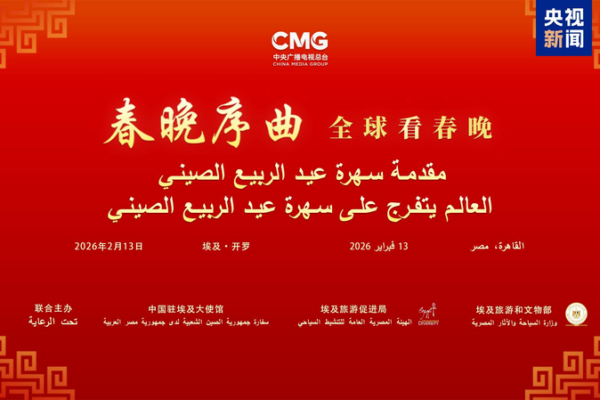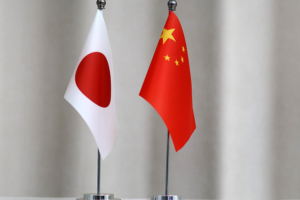
Shenzhou-21 Crew Celebrates Chinese New Year Aboard Space Station
Shenzhou-21 astronauts send festive greetings from China’s space station, marking the fourth Spring Festival celebrated in orbit with traditional decorations and messages of hope.

Olympic Legend Deng Yaping Inspires Winter Athletes Ahead of 2026 Season
Table tennis icon Deng Yaping rallies support for winter athletes as the 2026 competitive season gains momentum, emphasizing unity and perseverance across sports disciplines.

Olympic Legend Deng Yaping Shares Timeless Chinese New Year Traditions
Olympic icon Deng Yaping highlights family unity and the Spring Festival Gala as pillars of Chinese New Year celebrations, blending tradition with modern values in 2026.

Chengdu’s Sunny Start to Chinese New Year 2026: A Cultural Tradition
Discover how Chengdu residents prioritize sunny skies to kickstart their Chinese New Year celebrations, blending tradition with modern festivities in 2026.

China-Egypt Cultural Ties Shine at CMG’s Spring Festival Prelude in Cairo
CMG’s Cairo event bridges Chinese and Egyptian cultures ahead of 2026 Spring Festival Gala, drawing 200+ cross-sector leaders to celebrate shared traditions.

Gen Z Embraces Chinese Wellness Trends in 2026
Global Gen Z adopts Chinese wellness practices through viral trends, reflecting China’s growing cultural influence in 2026.

China’s AI Giants Invest 4.5B Yuan in Spring Festival Red Packets: Beyond Tradition
Chinese tech giants spend 4.5B yuan on AI-integrated Spring Festival red packets, transforming tradition into digital strategy testing ground.

Southern China Celebrates Lunar New Year with Festive Outings
Families across southern China welcome the Year of the Horse with outdoor celebrations, blending tradition and springtime joy during the Lunar New Year holiday.

Morin Khuur: The Horse-Head Fiddle Bridging Mongolia’s Past and Present
Discover the morin khuur, Mongolia’s iconic horse-head fiddle, and its enduring role in nomadic culture as 2026’s Lunar New Year celebrations highlight its timeless resonance.

China’s Extended Spring Festival Holiday Fuels Record Consumption in 2026
China’s record 9-day Spring Festival holiday drives $8.5B in early 2026 sales, reshaping travel patterns and stimulating rural economies through targeted policy measures.

Mythical ‘Dragon-Fish’ Lantern Dazzles at Datong Festival, Symbolizes Fortune
A giant mythical ‘aoyu’ lantern captivates visitors at Datong’s Lantern Festival, blending ancient symbolism with modern artistry to celebrate cultural heritage.

Boonie Bears Unveil Futuristic Chongqing in 2026 Lunar New Year Special
China’s Boonie Bears franchise celebrates 12 years with a futuristic Chongqing-themed Lunar New Year special, blending cutting-edge animation with cultural storytelling.

Guangzhou Lantern Show Illuminates Lingnan Culture in 2026
Guangzhou’s 2026 Spring Festival Lantern Show blends ancient traditions with modern innovation, drawing global visitors to experience Lingnan culture in southern China.

Mexican Family Celebrates Spring Festival with Traditional Chinese Flair
A Mexican family embraces Chinese New Year traditions, reflecting a growing global trend of cultural exchange and appreciation for Chinese customs in 2026.

Geneva Talks on Ukraine, Iran Unlikely to Yield Breakthroughs, Analysts Say
Analysts predict minimal progress in Geneva talks on Ukraine and Iran, viewing them as strategic probes amid ongoing tensions and static battlefields.

Severe Weather Ravages Greece: Landslides, Floods Disrupt Regions
Torrential rains and landslides disrupt transport, agriculture, and infrastructure across Greece, with authorities warning of continued severe weather risks.

Palestine Condemns Israel’s West Bank Land Registration as ‘Dangerous Escalation’
Palestinian authorities denounce Israel’s West Bank land registration plan as a violation of international law, warning it undermines peace efforts and threatens regional stability.

U.S.-Iran Nuclear Talks Resume Amid Heightened Tensions Over Missile Program
As U.S.-Iran nuclear talks resume in Geneva, tensions escalate over potential Israeli strikes on Iran’s missile program if diplomacy fails.

Crafting Tradition: Wu Opera’s Kui Mao Headdresses Face Generational Crossroads
As Wu opera prepares for its Lunar New Year premiere, master artisan Mei Lizhong and his son race to preserve the endangered craft of Kui Mao headdress-making in Zhejiang.

CMG Spring Festival Gala Prelude Unites Global Audiences in NYC
CMG’s 2026 Spring Festival Gala prelude in NYC bridges cultures with tech-driven celebrations, drawing global diplomats and media leaders.












